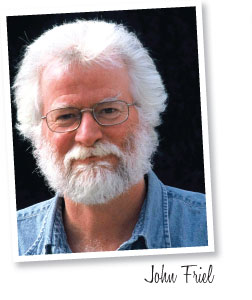12/27/2010
The Genetics of Change
John Friel

Challenging the status quo is every generation’s duty. I came of age in the 1960s and ’70s, and we took that duty seriously. It was our obsession. But there’s rebellion in the realm of new plant introductions, and it’s not the rumbling of a new generation of rambunctious young Turks. The status quo is being not merely questioned but actually attacked by its own architects and beneficiaries.
The recent Independent Plant Breeders Conference at Longwood Gardens was an unusual assembly of those who create new plants, and those who bring them to market. This convergence of art, science and commerce has happened only four times since its conception in 2004.
Though amiable, the two-day event saw some unorthodox, if not downright radical, ideas thrown out for discussion. Let’s frame this snapshot-in-time, and its ramifications, by defining what I’m calling the status quo.
Nowadays, new plants can come from anywhere. At one end of the spectrum are multinationals with dedicated breeding staffs, labs and test gardens. Some seek the Grail of the perfect petunia, some the next must-have rose; others specialize in a few perennial genera.
At the other end is the backyard gardener who happens upon a spontaneous sport or bee cross. In between are amateur and professional breeders and globe-scouring plant hunters, at every imaginable level of sophistication and financial backing. They’re all after what Rick Schoellhorn of Proven Winners calls “plants that make the gardener glad they gardened.”
Our industry has birthed a whole sub-industry. Proprietary rights management firms match new genetics with wholesale growers. They handle patent applications, licensing, monitoring and royalty distribution, freeing breeders to do their thing. California-based PlantHaven so epitomizes this species, founder Geoff Needham was chosen as keynote speaker.
Needham raised most eyebrows when he recommended scrapping U.S. plant patents. PlantHaven and its ilk could scarcely exist without the USPTO. But, said Geoff, it’s time to replace current protocols, which have protected more than 20,000 plants since 1930, with more stringent European-style Plant Breeders Rights. That would represent a sea change. Needham acknowledged it might take—guess what?—a generation.
Woody plant guru Dr. Michael Dirr asked, “How do we slow down the plant patent freight train?” The University of Georgia prof and author also co-owns Plant Introductions, Inc., whose website boasts, “breeding and evaluating thousands of selections in dozens of genera.” Those selections are, naturally, patented.
Even Dirr’s colleague Dr. Allan Armitage, who famously declared new varieties “the lifeblood of the industry,” now laments the pace of new introductions. So does Adrian Bloom of Blooms of Bressingham, serial new-plant introducer and multiple patent holder. Voices of experience all, not to be ignored when they advocate biting the hand that feeds.
I play a small role in organizing a yearly perennial conference at Swarthmore, Pennsylvania. In this year’s evaluation forms, an attendee grumbled, “Do we really need another echinacea?” I thought of the IPBC discussion, of course, but also of something, or rather someone, else.
Henry Ford built an empire from scratch, then nearly destroyed it by insisting that his revolutionary Model T was all the car anyone needed. He had to be dragged into a new status quo where consumers demanded and deserved frills like electric starters, heaters and headlights that actually illuminated the road.
Echinacea is the perfect parallel: Like the T, until recently it came in just one or two colors. Does anyone think we’ve achieved the perfect coneflower/car? Should further breeding/engineering be banned?
New plants are a pricey gamble. Participants spoke of investing $25,000 in every introduction, discarding over 99% of their trials. “Failure?” said one. “That’s a topic I’m familiar with.”
To thrive, we must reward and protect our “inventors.” If PBR does that better than the USPTO, then Needham is right. If it slows the train and brings us truly superior, not marginally different, varieties, then he and Dirr and the others are all right.
Do we need another echinacea? Yeah, man, we do. Today’s radical, revolutionary variety is tomorrow’s Model T.
GP
John Friel is marketing manager for Emerald Coast Growers and a freelance writer.